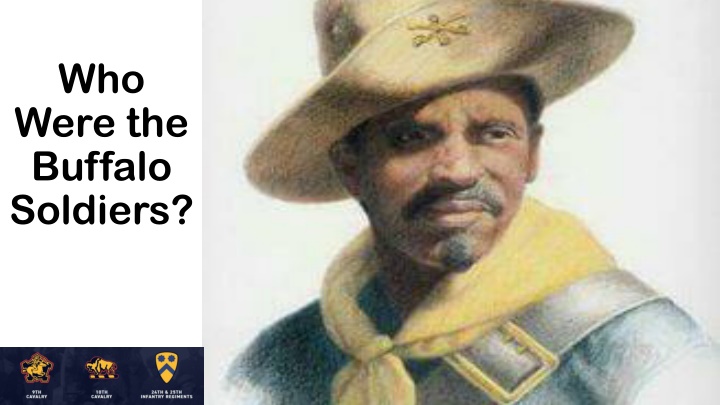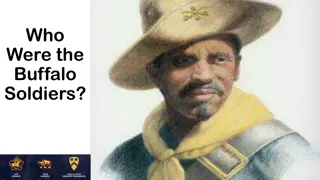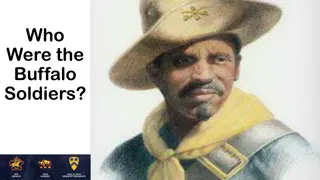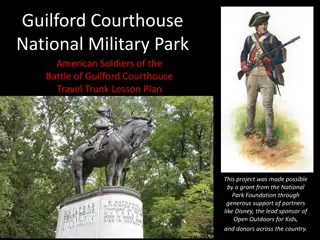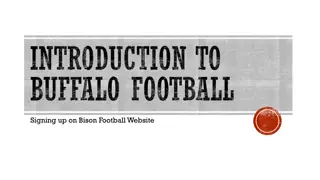The Legacy of the Buffalo Soldiers in American History
The Buffalo Soldiers were African-American cavalry regiments in the U.S. Army, known for their bravery and valor during the late 19th and early 20th centuries. Former slaves seeking opportunities after the Civil War, these soldiers played crucial roles in Westward expansion, major conflicts, and Indian Wars. Revered by Native Americans for their combat skills, the Buffalo Soldiers left a lasting mark on American history with their distinguished service and accomplishments.
Download Presentation

Please find below an Image/Link to download the presentation.
The content on the website is provided AS IS for your information and personal use only. It may not be sold, licensed, or shared on other websites without obtaining consent from the author.If you encounter any issues during the download, it is possible that the publisher has removed the file from their server.
You are allowed to download the files provided on this website for personal or commercial use, subject to the condition that they are used lawfully. All files are the property of their respective owners.
The content on the website is provided AS IS for your information and personal use only. It may not be sold, licensed, or shared on other websites without obtaining consent from the author.
E N D
Presentation Transcript
Who Were the Buffalo Soldiers?
The United States Congress passed a law in 1866 authorizing the U.S. Army to form cavalry and infantry regiments of Black men.
Buffalo Soldiers was the nickname given to members of the four African- American cavalry regiments of the U.S. Army who served in the western United States from 1867- 1896.
Many of the young men who served in these units were former slaves. They wanted a life with more opportunities after the Civil War.
The military offered former slaves better opportunities than they had in the south. The soldiers were paid $13.00 per month in 1866, which equaled to approximately $233.00 in 2022.
The Buffalo Soldiers became pioneers of Westward expansion and participated in every major conflict of the late nineteenth and early twentieth Centuries.
Through out the era of the Indian Wars, approximately 20 percent of the U.S. Calvary troopers were Black, and they fought in over 177 engagements. Their combat skills, bravery, and looks on the battlefield inspired the Indians to call them Buffalo Soldiers.
It was a name that symbolized the Native Americans respect for the Buffalo Soldiers bravery and valor. The Buffalo Soldiers wore the name with pride.
From 1867 to the early 1890s, these regiments served at a variety of posts in the Southwestern United States and the Great Plains regions. They participated in most of the military campaigns in these areas and earned a distinguished record.
During the Indian Wars, thirteen enlisted men and six officers from the four regiments earned the nation s highest military honor, the Congressional Medal of Honor.
In addition to the military campaigns, the Buffalo Soldiers served a variety of roles along the frontier, from building roads to escorting the U.S. mail. This Photo by Unknown Author is licensed under CC BY-SA
The Buffalo Soldiers also served in the Spanish-American War, the Philippine- American War, the Mexican Border War, World War I, and World War II.
President Harry S. Truman ordered the end of racial segregation in the military, however the actual achievement of this process in the post-World War II military was slow.
In 1951, during the Korean War, the last remaining segregated Buffalo Soldier regiments integrated into other units.
African American men have fought in every American war, yet the Buffalo Soldiers, two cavalry and four infantry regiments, have a unique place in the history of the United States. They helped their country to become a vast continental nation through their service during westward expansion. They also fought during World Wars I & II, which solidified the United States as a world power.
Even though they faced discrimination in the Army and in the towns where they were stationed, the Buffalo Soldiers persevered and are recognized today for their sacrifices, service and contributions to our country. Buffalo Soldiers Day is celebrated on July 28th of each year, commemorating the formation of the first regular Army regiments consisting of African American soldiers in 1866.
